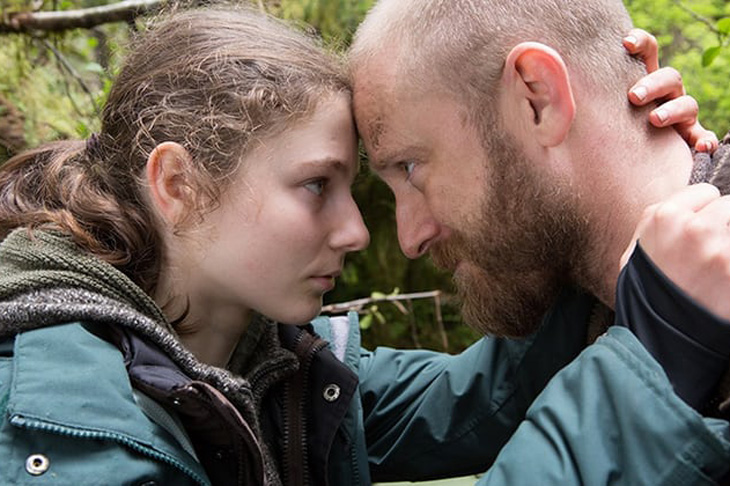Debra Granik, the writer-director who made quite a splash with Winter’s Bone (which launched the career of Jennifer Lawrence in 2010), has returned with Leave No Trace, which is also powerfully compelling. By rights, it shouldn’t be. By rights, this tale of a father and daughter who wish to keep themselves to themselves (essentially) should be as dull as ditchwater. It is slow. Little is said and little happens — it’s inaction-packed, if you like — yet it pulls you in and keeps you pulled in. I’m still turning it over in my mind days later. It will certainly leave a trace in you, in other words.
Adapted from Peter Rock’s novel My Abandonment, the film stars Ben Foster as Will, a Vietnam vet, and Thomasin McKenzie as his teenage daughter, Tom. The pair deliberately live an off-grid life in a national park outside Portland, Oregon, grubbing for mushrooms, catching rainwater, building fires, practising how to hide amid the ferns and the giant evergreens should the authorities ever call. Tom does not attend school, but learns from an old encyclopaedia, and her relationship with her father is tender, loving, mutually respectful. They share an intimate, intricate connection conveyed by the way they behave round one another, rather than through dialogue. We immediately understand their goal — leave us be! We’re fine! — and immediately share it. (Let them be! They’re fine!) But the authorities call — with sniffer dogs; bummer — and they’re forced into the system.
At this point you will think: oh, it’s that film. It’s the film where the system will eat them alive. Or at least it’s the film where the system will try to eat them alive. Or it’s the film where they enter the system as rebellious individuals but come out as zombies. (See Family Life, One Flew Over The Cuckoo’s Nest, etc.) But it isn’t any of those films. Here, you’re never certain where the narrative is going. You’re only certain that you wish to go with it.
The characters are brilliantly three-dimensional. The drama and tension — and often it is extremely tense — come not from without, but within, as desires and goals shift, especially Tom’s. So it’s not as obvious as putting others in their path to oppose them. There are no villains, as it’s not that film either. In fact, everyone they meet is sympathetic and kind, including their social worker who is well meaning even if Will and Tom can’t be allowed to remain ‘homeless’. They’re placed in a small house on a farm where he cuts down Christmas trees and she makes a friend, perhaps the first friend of her life, and acquires a toy (a plastic horse; this is one of the film’s bigger events) that is perhaps the first toy of her life. They’re soon on the move again, but we know that something within Tom has changed.
Granik trusts us, so doesn’t go in for exposition or back stories. We aren’t told what happened to Tom’s mother, for example. We don’t know exactly what happened to Will in the military, but can see that he has been traumatised. Every time a helicopter flies over he doesn’t flinch — it’s never as crude as that — but we know the flinch is there because Foster puts it there. We can see it in Will’s eyes. We can see that he can’t endure other people simply by his demeanour. This touches on the political — the medicating of Vietnam vets; the marginalisation of the poor — but it is far more interested in the psychological, and in Tom’s growing away.
If anything, this is a coming-of-age film and McKenzie’s performance is incredible. She absorbs our attention. She is naturalistic. She is nuanced, adding layer on layer. She matures in front of our very eyes, because that is what Tom does. And unusually, we have here a girl whose physicality and sexual being count for nothing. It’s her mind that matters. And only that.
Got something to add? Join the discussion and comment below.
Get 10 issues for just $10
Subscribe to The Spectator Australia today for the next 10 magazine issues, plus full online access, for just $10.
You might disagree with half of it, but you’ll enjoy reading all of it. Try your first month for free, then just $2 a week for the remainder of your first year.














Comments
Don't miss out
Join the conversation with other Spectator Australia readers. Subscribe to leave a comment.
SUBSCRIBEAlready a subscriber? Log in